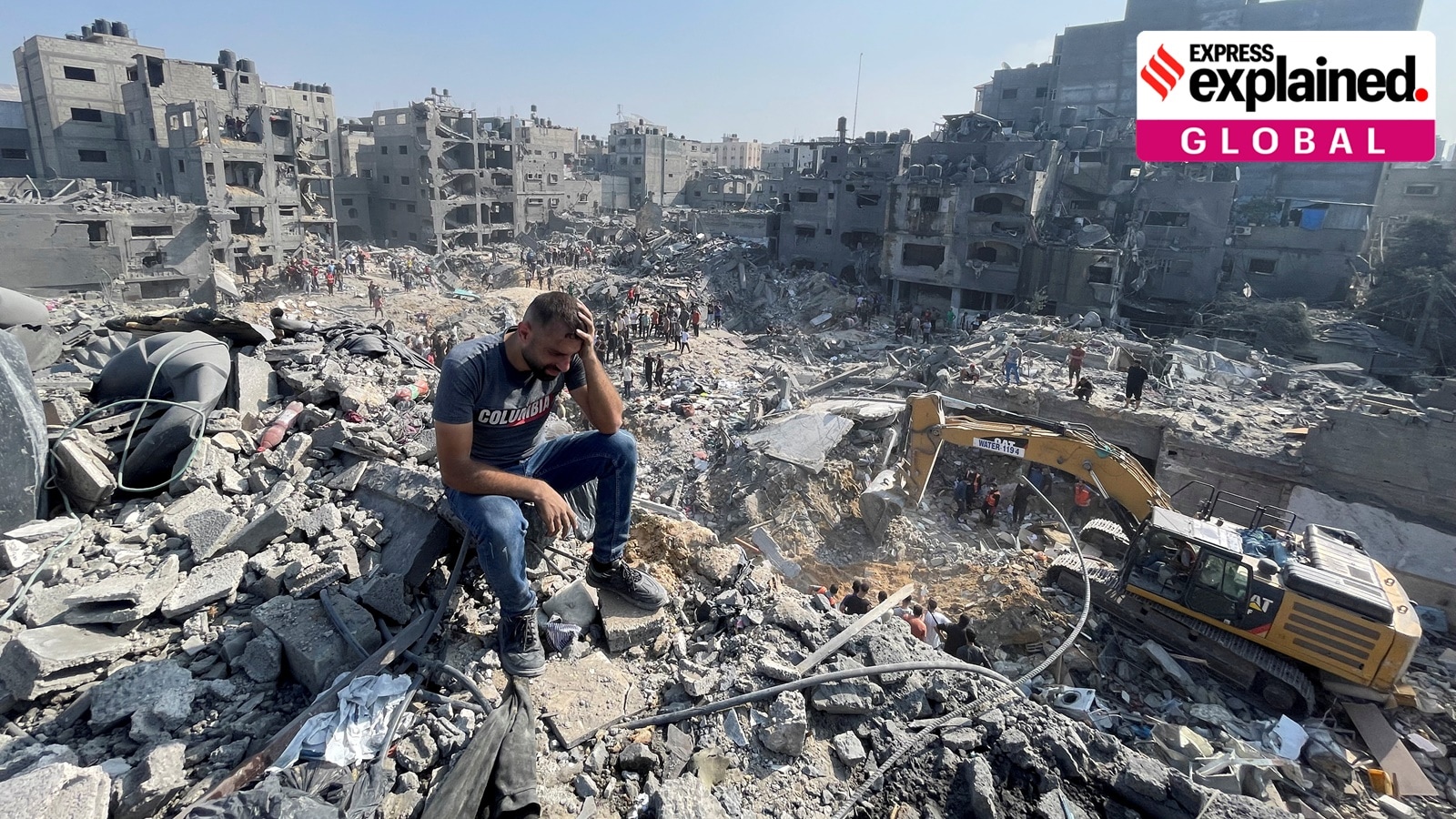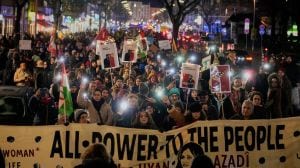After Israel suffered the worst-ever attack on its territory under his watch, Prime Minister Benjamin Netanyahu has vowed to “crush and destroy” Hamas, the political and militant organisation in charge of the Gaza strip.
However, many are pointing out that it was the Israeli government that helped strengthen Hamas, in order to undermine Fatah, the more internationally accepted Palestinian political party.
How did the Palestinian territories of Gaza and West Bank end up split between Hamas and Fatah? Why would Israel want to boost Hamas at the cost of Fatah? On what basis is this claim made?
First, how are Hamas and Fatah different?
Fatah is the reverse acronym for Ḥarakat al-Taḥrīr al-Waṭanī l-Filasṭīnī, which means the ‘Palestinian National Liberation Movement’. It was founded in 1959 by members of the Palestinian diaspora, including Yasser Arafat (1929-2004). In the 1980s, it decided to forego violence and negotiate instead. The Oslo Accords of 1993-95 — in which Israel and Palestine recognised each other for the first time — were signed under Arafat.
While the secular and moderate Fatah was recognised by Western capitals and given aid money, Israel’s squeeze over the lives of Palestinians continued, and many began to feel that the negotiations and the accords hadn’t helped them.
Harakat al-Muqawama al-Islamiya (Islamic Resistance Movement), or Hamas, is an offshoot of Egypt’s Muslim Brotherhood. It was founded in 1987 and believes in armed resistance to Israel. While initially, it had refused to recognise Israel, in 2017, it said it was willing to accept a Palestinian state based on 1967 borders. Its strong Islamic ideology and its uncompromising resistance to Israel have made it attractive to many Palestinians.
Internationally, it has been designated as a territorist organisation by Israel, the United States, the European Union, Canada, Egypt and Japan.
Story continues below this ad
Israel’s 2005 withdrawal and after
In 2005, Israel decided to withdraw from the Gaza Strip, home to more than 20 lakh Palestinians that it had occupied since the 1967 Arab-Israeli war. This was the same year that Hamas began participating in Palestinian public life as a political party. In January 2006, legislative elections were held, and Hamas defeated Fatah in Gaza. The two parties were unable to come to a power-sharing deal and Hamas took over Gaza amid violence between the two sides.
Meanwhile, Israel and the West refused to acknowledge the Hamas government until it agreed to three conditions — giving up violence, recognising Israel, and adhering to all previous accords. They also imposed sanctions and began pressuring Fatah leader Mahmoud Abbas to sack the Hamas government.
In 2007, Fatah and Hamas signed the Mecca Agreement, aimed at ending the clashes and forming a national unity government. A Fatah-Hamas joint government was formed, but the agreement unravelled within months. Hamas then seized Gaza, and has been in power in the province since. Israel, on its part, has since imposed a total blockade on Gaza.
The role of Israel and its allies
Why would Israel want to strengthen Hamas, whose central ideology is to wage an armed struggle against it? Simply because a divided Palestinian leadership would mean that negotiations to establish a state of Palestine would never progress.
Story continues below this ad
Experts have argued that Fatah is largely seen as a responsible organisation negotiating for peace. Thus, when dealing with it, Israel too would have to demonstrate a genuine commitment to the creation of Palestine, or be recognised as the party holding up peace talks. A divided leadership, especially with one faction being a violent Islamic organisation, makes it much easier to blame Palestinians for “never really wanting peace”.
And over the years, experts have cited both direct and indirect evidence of Israel helping Hamas.
First is the claim that by not following the letter or spirit of any of the agreements it signed with Fatah — the stalled Oslo Accords, the failed 2000 Camp David summit — Israel was weakening Fatah in the eyes of Palestinians. The failure of the talks process strengthened hardline groups like Hamas, Palestine Islamic Jihad, etc.
Next is more “direct” evidence — the fact that Israel formally allowed millions of dollars of Qatari money to go to Hamas, as well as comments made by some of its leaders.
Story continues below this ad
The 2005 withdrawal from Gaza is often seen as Israel’s great step towards peace, which the Palestinians repaid by electing the extremist Hamas to power. However, an October 2004 letter from the Permanent Observer of Palestine to the United Nations, to the Secretary-General and the President of the Security Council, flags concerns that Israel’s intentions were not so genuine.
The letter reproduces what Dov Weisglass, senior adviser to then Prime Minister Ariel Sharon, told the newspaper Haaretz in an interview. “The disengagement [from Gaza] is actually formaldehyde. It supplies the amount of formaldehyde that is necessary so there will not be a political process with the Palestinians.” Indeed, after the withdrawal, Israel continued its tight economic control over Gaza, and further entrenched itself in the West Bank. The resulting disillusionment within Palestinians contributed to Hamas’ election victory.
There are also comments that have been directly attributed to Netanyahu. According to Times of Israel, Netanyahu, at a party meeting in 2019, is reported to have said that “those who oppose a Palestinian state should support the transfer of funds to Gaza, because maintaining the separation between the Palestinian Authority in the West Bank and Hamas in Gaza would prevent the establishment of a Palestinian state.”







































